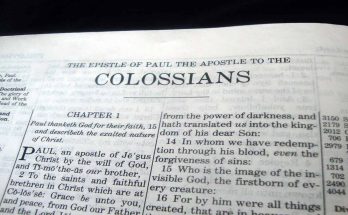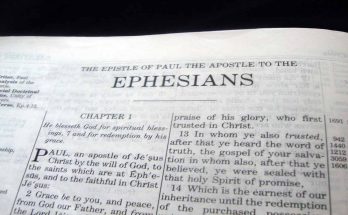Gospel of Matthew
In the anticipation of the Messiah, the long-awaited King of Israel, the Gospel of Matthew eloquently begins by establishing Jesus Christ’s lineage, tracing His royal ancestry back to the great King David. However, Matthew’s narrative doesn’t stop there; it goes on to unveil a profound truth – Jesus wasn’t destined to be merely an earthly monarch, but a heavenly King whose reign would transcend even the glory of David’s. His kingdom, uniquely, would be eternal and boundless.
From the moment of Jesus’ birth, there was a clear recognition of His divine kingship. King Herod, though a ruler himself, trembled at the thought of Jesus’ kingship and sought to thwart it. Satan, too, felt the threat of Jesus’ sovereignty and attempted to hinder His divine mission. Yet, in striking contrast, there were those who bowed in worship, offering regal gifts to the newborn King. This duality serves as a powerful reminder that we, too, must be willing to acknowledge Jesus for who He truly is – the King of our lives.
The Sermon on the Mount, a cornerstone of Jesus’ teachings, outlined the principles of living within His kingdom. Through numerous parables, Jesus masterfully highlighted the stark contrast between His heavenly kingdom and the earthly realms. Traits such as forgiveness, peace, and selflessness emerged as defining characteristics of those who would attain greatness in the future kingdom of God. The path to such greatness, Jesus revealed, lies in living by God’s standards in the present. In essence, He came not only to show us the way but to empower us to be faithful citizens of His kingdom.
Despite being formally presented to the nation of Israel, Jesus was tragically rejected by many. It indeed appears paradoxical for a King to be accused, arrested, and crucified. However, Jesus, in His ultimate act of sovereignty, displayed His power even over death through His glorious resurrection. This triumph over the grave became the gateway for us to enter into His eternal kingdom. In light of this compelling evidence, it is our privilege and responsibility to accept Jesus as not only our Savior but also our Lord and King.
In embracing Jesus as our sovereign, we find purpose, hope, and the promise of eternal life within His everlasting kingdom. As His faithful subjects, may we continually strive to live according to His divine standards, thereby manifesting His kingship in our daily lives and bringing glory to His name.
Writer of Gospel of Matthew
While the authorship of this Gospel remains anonymous within its text, early Christian tradition has consistently ascribed it to Matthew, who was not only one of the twelve apostles but also held the profession of a tax collector before his divine calling. Other than his name and occupation, little is known about him. Tradition says that for fifteen years following the resurrection of Jesus he preached in Palestine and then conducted missionary campaigns in other nations.
Date Written
The precise date of the writing of the Gospel of Matthew is not known. Some scholars argue for a date later than the destruction of Jerusalem in A. D. 70, since Jesus alludes to this event in 24:1-28. Of course, such a conclusion is warranted only if one denies Jesus’ ability to predict the future. In light of Irenaeus’s assertion that Matthew composed his Gospel while Peter and Paul were still living, it is traditionally dated to the late ’50s or early ’60s.
Purpose of Gospel of Matthew
The purpose of the Gospel of Matthew was to present the Lord Jesus Christ as Israel’s king.
Matthew was “The book of the generation of Jesus Christ, the son of David, the son of Abraham” (Matthew 1:1). It was the book of Jesus Christ as the perfect Israelite – the rightful king of Israel. Christ was presented as the inheritor of David’s throne, having traced His royal lineage from Abraham (the patriarch of the nation) to David (the patriarch of the throne) to Joseph (the husband of Mary, but not the father of Jesus). As the son of Abraham, Jesus represented the nation of Israel to God (as the Son of man).
Matthew was the book of being “in Israel.” From the call of Abraham, God had chosen a people for His name. This family that became a nation had a greater revelation of God than the other nations. They also had greater accompanying privileges, as well as greater responsibility before God. The Jews living during the earthly ministry of Jesus were all under the Mosaic law, a national code of conduct that had long since been added for Israel’s observance. The law was not meant to be a means of salvation, for a Jew was born into a relationship with Jehovah ( as servants of God). The law was the revelation of a righteous way of living for those who were already redeemed by God (at the Passover out of Egypt) and, therefore, belonged to Him. However, the Israelite was not guaranteed eonian life (resurrection life in the kingdom of God). He was expected to fear God and keep His commandments (Ecclesiastes 122:13). If he did not, God could, and probably would cut him out of Israel, and he would lose all the privileges that he once had by being a part of that nation.
Today, when those who have not understood the right division have gone to the Bible to determine if there is eternal security and have started the Gospel of Matthew, they come out of the book assured that one certainly can lose his salvation. The reason is that a “servant,” as described in this book, received his position by means of birth as an Israelite, yet upon proving to be an unfaithful servant, he could be cast into outer darkness, where there is weeping and gnashing of teeth (great sorrow and regret at having lost a place in the kingdom as a Jew). He found no security at all in being “in Israel.” Having been born a servant of God, he did not have to have faith at all in order to attain it. The only determination was whether or not he would be deemed a faithful servant. This is not at all like being “in Christ,” as set forth in Ephesians – the position which can only be a reality through one’s personal faith in the Lord Jesus Christ, regarding Who He is and what He did that procured salvation for us.
Theological Contribution
Matthew’s main subject is the “Kingdom of Heaven” or “Kingdom of God.” This kingdom is mentioned 51 times in the Gospel of Matthew, twice as often as in any other gospel. The kingdom is already here in Jesus, but it is not yet fulfilled. The kingdom extends like a fishing net, gathering people from every part of society, offering a new life in the life-changing presence of God, and it excludes any and all competitors for its allegiance.
The kingdom of God means the rule or reign of God – in the entire universe, in the world, and in our hearts. The primary indication of the presence of the kingdom in the world is the transformation of life, both individually and socially.
Special Considerations
The Gospel of Matthew has at least five special considerations that will be mentioned briefly here:
- Matthew sought to prove to the Jews that Jesus was the Christ, the fulfillment of the Old Testament prophecy. A recurring statement that occurs in this gospel is, “All this was done that it might be fulfilled which was spoken by the Lord through the prophet”.
- Matthew has a special interest in the church, which by the time this gospel was written had become the dominant factor in the lives of Christians. Indeed, Matthew is the only gospel to mention the word “church”.
- Matthew has a strong interest in eschatology (the doctrine of last things) – that is, in the second coming of Jesus, the end of the age, and the final judgment.
- Matthew has a great interest in the teachings of Jesus, especially concerning the Kingdom of God.
- Matthew writes to show that Jesus is the King to whom God has given power and authority to redeem and to judge humankind.
Frequently Asked Questions (FAQ)
Who was Matthew, and why is his Gospel significant in the New Testament? Matthew, also known as Levi, was one of the twelve apostles and a tax collector before becoming a disciple of Jesus. His Gospel is significant as it serves as a comprehensive account of Jesus’ life, teachings, and ministry. Matthew’s focus on connecting Old Testament prophecies with Jesus’ life makes his Gospel particularly important in understanding the fulfillment of biblical promises.
What are the key themes that run through the Gospel of Matthew? The Gospel of Matthew addresses several key themes, including the arrival of the promised Messiah, the kingdom of heaven, ethical teachings (such as the Sermon on the Mount), discipleship, and the role of Jesus as the Son of God. Understanding these themes helps readers grasp the depth and purpose of Matthew’s narrative.
How does Matthew present Jesus as the fulfillment of Old Testament prophecies? Matthew extensively references Old Testament prophecies to demonstrate Jesus as the fulfillment of Messianic promises. The Gospel highlights the genealogy of Jesus, events in His life, and specific teachings that align with various prophetic texts. This emphasis reinforces the continuity between the Old and New Testaments and establishes Jesus’ authority.
What is the significance of the Sermon on the Mount in Matthew’s Gospel? The Sermon on the Mount, found in Matthew chapters 5-7, is a pivotal section where Jesus delivers essential teachings on morality, discipleship, and the nature of the kingdom of heaven. Understanding the significance of this sermon provides a foundation for ethical Christian living and reveals Jesus’ radical teachings that challenge conventional wisdom.
How does Matthew emphasize the universal appeal of Jesus’ message? Matthew’s Gospel not only highlights Jesus’ interactions with the Jewish community but also emphasizes the universal nature of His message. Through events like the visit of the Magi and the Great Commission, Matthew underscores the global significance of Jesus’ mission, making it relevant for people of all nations and backgrounds. This universal appeal is a distinctive feature of Matthew’s narrative.
Scripture Study Resources
ESV Study Bible – Study Bibles give you a deeper understanding of God’s Word with tools for life application like commentary, maps, charts, concordance, and study notes. Search our popular translations- NIV, ESV, NKJV, KJV and more!
Believer’s Bible Commentary: Second Edition – A Bible commentary is a written, systematic series of explanations and interpretations of Scripture. Commentaries often analyze or expound on individual books of the Bible, chapter by chapter and verse by verse. Some commentary works provide analysis of the whole of Scripture.
The New Strong’s Expanded Exhaustive Concordance of the Bible – The best concordance for word study! This exclusive new edition of a legendary classic puts generations of biblical research at your fingertips. A valuable tool for pastors, teachers, and students of the Bible.
Vine’s Complete Expository Dictionary of Old and New Testament Words – This classic word study resource allows you to study the meaning of biblical words in the original languages without spending years learning Greek or Hebrew. A great resource for students, seasoned pastors, and anyone who enjoys biblical word studies–even if they have little to no formal training in Hebrew or Greek.
Halley’s Bible Handbook – The beloved and classic Bible companion has been thoroughly updated, while retaining its time-honored features and Dr. Halley’s highly personal style, to offer even greater clarity, insight, and usefulness.
Click here to print or download the Scripture outline “Gospel of Matthew – The Good News According to Matthew“




